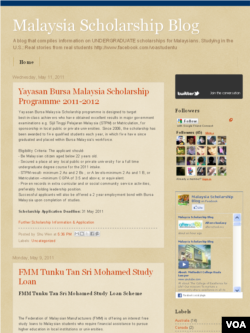Shu Wen Teo is a sophomore at Colby-Sawyer College in New Hampshire, where she studies biology (and chemistry, and business administration, and would study political science too if she had the time). She comes from Malaysia, and in addition to keeping up her busy academic schedule, she has devoted a lot of time to helping other Malaysian students learn about studying in the U.S.
Shu Wen has participated in education events back home in Malaysia and runs the Malaysia Scholarship blog – a blog devoted to finding and publicizing scholarship opportunities for Malaysian students.
We talked over Skype recently about her struggle to adapt during her first year at Colby-Sawyer, why she’s grateful for her liberal arts education, and how studying in the U.S. has changed her as a person.
Have you had a good experience so far?
The first year, not really. I was really passive when I first came here, probably because of the culture shock. ... Then the second year I started to get active and I got involved in the cross-cultural club particularly, and promoting cultural differences in the college.
I’m looking forward to the junior year, actually, because things have been getting better.
Did you ever regret your decision to come here?
A little bit, actually. Because the way of teaching and learning system here is really different and I was not used to it.
We had a course called “Pathway,” where there was a lot of discussion and participation in class. I think I got a B- because I was so passive that I didn’t speak up in class, though I got an A in essays every time. But my discussion and participation points really pulled the grade down. Then after that I kind of got familiar to that kind of system. And so we had another Pathway course again this semester, and I would say I am definitely improving.
Here, where Colby-Sawyer is so small, the professor will even notice if you are missing from the class. So they will realize if you don’t speak up in class. That’s really scary.
Why did you choose to study in the U.S.?
Originally, like all Malaysians, after I graduated from high school I applied for a government scholarship, and I got an offer to study English degree in Australia. But I think this is not what I wanted. Because if I take that offer and if I graduate, I have to serve the government for 10 years, because it’s a bonded scholarship.
So I realized that there’s no wiggle room to do what I’m interested in if I study in Malaysia. So I started to attend a U.S. education workshop organized by a bunch of students from Ivy Leagues. They talked about how free the U.S. education is and they talked about liberal arts education where if you are undecided of what your major is you can try a couple of disciplines first until you find your passion. It kind of struck me, so I just took my chance and applied to several schools in the U.S., and finally got in. ...
Shu Wen talks to EducationUSA about the Opportunity Grant she received:
Actually, a lot of Malaysians would not even think of Colby-Sawyer or even Swarthmore or these kinds of colleges because they only aim for Ivy Leagues. So if you talk about Bates College or other liberal arts colleges, they will think you’re going to study painting or drawing in that college, which is a misconception among Asians, actually, among Southeast Asians. So that’s why when I went back last summer, I joined a U.S. education workshop to promote the liberal arts education to those Malaysians who are interested in pursuing their education in the U.S.
Tell me more about that, and about the Malaysia Scholarship Blog...
I worked with a group of other students to promote U.S. education in Kuala Lumpur, the capital of Malaysia. I think about 200 high school students came, along with their parents. Actually, a couple of them even got into Cornell and those prestigious colleges.
And besides that I have been advocating U.S. education on websites as well, and especially Colby-Sawyer. That’s why the number of international students applying to Colby-Sawyer has increased dramatically this year. So I got a Sawyer Fellowship award for that contribution to the college. ...
I have a lot of people contacting me, for example, people from other countries and say they have these scholarships because they came across my blog. So they contact me regarding the information, so I just help them to put out the information. And also every day I spend a lot of time Googling.
What compelled you to start doing this?
Since I came here I’ve undergone significant personal transformation, especially in terms of my knowledge. Because before that I was very – I wouldn’t say closed-minded, but I wasn’t aware of the issues around me and the global issues. So when I came here I was very much exposed to a lot of global concerns through my Pathway course, which was citizen leadership, and also through my internship experience, which is not emphasized in Malaysian education.
So I want to bring this to the attention of Malaysians and I hope they will benefit from this and go back to Malaysia and serve the country in the future. Because I’ve found that the brain drain issues have been quite serious actually, and I think the quality of education has been degrading dramatically over the years because of some political concerns – the racial issues. So I hope it will kind of open up their mind when they study abroad and bring back what they learned and serve the country.
Is studying in the U.S. the right choice for everyone?
I would say different people have different ambitions. Those who aim to just make more money, which is the ambitions of most Malaysians, they would prefer to pursue education in UK or Australia so they can obtain their degree earlier and faster and go into society and work. But for those who are interested in increasing their knowledge on different breadth of disciplines, I‘d encourage them to pursue their education in the U.S., particularly because the education system here is really different, due to the teaching and learning system.
» Listen to the full interview
Submit your own stories about learning English or coming to the U.S. using the form below, or email jstahl@voanews.com.
Loading...






